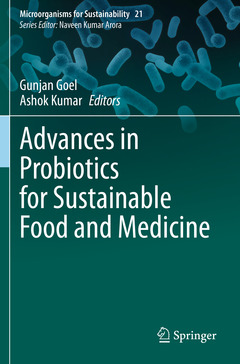Description
Advances in Probiotics for Sustainable Food and Medicine, 1st ed. 2021
Microorganisms for Sustainability Series, Vol. 21
Language: English
Subjects for Advances in Probiotics for Sustainable Food and Medicine:
Keywords
Fermentation; Food; Probiotics; Prebiotics; Metabolic engineering
Publication date: 11-2021
240 p. · 15.5x23.5 cm · Paperback
Publication date: 11-2020
240 p. · 15.5x23.5 cm · Hardback
Description
/li>Contents
/li>Biography
/li>Comment
/li>
This book focuses on probiotics as sustainable foods and medicines, discussing issues such as screening and identification of probiotics, health claims, and advances in processing technologies, as well as food safety. Based on sound scientific research, the book is a unique reference resource for food scientists interested in development of probiotic based functional foods and their marketing. It will also appeal to those working in the area of regulations regarding the use of and health claims for fermented foods, both locally and globally.
Chapter 1. Probiotics and their potential applications: An Introduction.- Chapter 2. Sources and Selection criteria of probiotics.- Chapter 3. Indigenous fermented foods as a potential source of probiotic foods.- Chapter 4. Prebiotics for Probiotics.- Chapter 5. Probiotics as live biotherapeutics: prospects and perspectives.- Chapter 6. Probiotics as functional foods.- Chapter 7. Probiotics in Livestock and Poultry Nutrition and Health.- Chapter 8. Probiotics for Human Health. Chapter 9. Influence of probiotics over AMPK-dependent health activity: a look into its molecular mechanisms.- Chapter 10. Metabolic engineering approaches for improvement of probiotics functionality.
Dr Gunjan Goel is an Associate Professor at the Department of Microbiology, Central University of Haryana, Mahendergarh, India. He has completed his Ph.D. in Microbiology at the National Dairy Research Institute (ICAR), Karnal, India, focusing on the microbial degradation of polyphenols. During his postdoctoral research at the University of Hohenheim, Germany and the University of Ghent, Belgium, he studied the effects of plant secondary metabolites in enhancing the functions of rumen microbes, as well as metabolic pathways of fatty acids. He has published number of research papers in journals of international repute. His current research focuses on the microbial ecology of gut, bioaccessibility and bioavailability of food ingredients in in vitro simulated gut model systems, and the assessment of probiotics using in vitro and in vivo models. He is life member of the Association of Microbiologists of India (AMI) and the Probiotic Association of India (PAI).
Dr. Ashok Kumar is an Assistant Professor at the Department of Biotechnology and Bioinformatics, Jaypee University of Information Technology, India. He has been working in the area of microbial enzymes and biocatalysis for 12 years. He completed his Ph.D. in Biotechnology at the Department of Biotechnology, Himachal Pradesh University, India, in 2013, and he worked as a post-doctoral fellow at the State Key laboratory of Agricultural Microbiology, Huazhong Agricultural University, Wuhan, China for two years. He also worked as brain pool researcher/Assistant Professor at Konkuk University, South Korea. Dr. Ashok’s interests include microbial biotechnology, CO2 conversion, enzyme immobilization, biomass degradation, biofuel synthesis and biotransformations. He has published 58 research papers in reputed international journals, 5 books and 25 book chapters. Dr. Ashok serves as an editor for a number of leading international journals.




